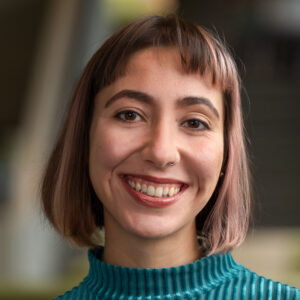 Alexandra Greene holds a Master of Arts in Gender Studies, a Graduate Diploma in Communication and Media Studies, and a Bachelor of Arts (Honors) in English Literature and Philosophy. For her MA thesis, she used data from her ethnographic fieldwork in a refugee camp in Greece, aiming to explore the affective, digital practices of refugee women waiting to move on. Her research interests include gender, media, migration, agency, emotionality, social justice, solidarity and research-creation. Since January 2019, she has been working as a PhD with the Engaged Scholarship and Narratives of Change research project. Her research explores the collaboration between academia and society in the United States in promoting the social inclusion of refugees.
Alexandra Greene holds a Master of Arts in Gender Studies, a Graduate Diploma in Communication and Media Studies, and a Bachelor of Arts (Honors) in English Literature and Philosophy. For her MA thesis, she used data from her ethnographic fieldwork in a refugee camp in Greece, aiming to explore the affective, digital practices of refugee women waiting to move on. Her research interests include gender, media, migration, agency, emotionality, social justice, solidarity and research-creation. Since January 2019, she has been working as a PhD with the Engaged Scholarship and Narratives of Change research project. Her research explores the collaboration between academia and society in the United States in promoting the social inclusion of refugees.
‘As someone who believes that academia can and should play a role in social justice, I believe it is not only productive but ethically necessary to treat research as an opportunity to build bridges between academic communities and communities that exist outside the academy, especially communities that are most affected by systemic inequalities.’
What is your scholarly background and expertise?
My research is based in intersectional feminism, arts-based community activism and humanities. I have a Master of Arts in Gender Studies, a Graduate Diploma in Communication and Media Studies and a Bachelor of Arts (Honours) in English Literature and Philosophy. For my MA thesis, I used ethnographic fieldwork conducted in a refugee camp in Greece to explore the affective, digital practices of refugee women who are waiting to move on. Over the years, I have developed research interests and expertise in gender, media, migration, agency, emotionality, social justice, and research-creation. In January 2019, I started my PhD in Sociology at the VU under the supervision of Prof. Halleh Ghorashi. My research is on the collaboration between academia and society in the United States in promoting the social inclusion of refugees.
Welke rol heb jij binnen de Refugee Academy?
Mijn promotieonderzoek is ingebed in een groter door NWO VICI-gefinancieerd project dat kritisch geëngageerde wetenschap en verhalen over verandering in drie contexten onderzoekt (Nederland, Zuid-Afrika en de Verenigde Staten). Dit project, en mijn onderzoek, zijn afgestemd op verschillende doelen van de Refugee Academy, namelijk de bevordering van gemeenschap, participatie en sociale inclusie. Als promovendus voltooi ik literatuuronderzoek, verricht ik kwalitatief onderzoek en analyseer ik gegevens die relevant zijn voor de belangrijkste thema’s van de Refugee Academy.
What do you think is most important within the Refugee Academy, and why?
The Refugee Academy provides a framework for connecting different civil society stakeholders so that they can share knowledge, experiences and practices, build each other’s capacity and think together about concrete ways to promote refugee inclusion. During this exchange, the experiences of refugees are central. There is an emphasis on reflexivity, allowing participants to critically reflect on power, social positioning and context, and the ways in which discourses of exclusion are normalized, internalized and reproduced. By collaborating and putting refugees and their stories at the centre of this exchange, the goal of the Refugee Academy is to challenge and transform structures of exclusion, and to bring about genuine inclusion of refugees.
What is your personal ambition within the Refugee Academy, and how would you connect this to your work and personal life outside the Refugee Academy?
Within the Refugee Academy, I want to examine and reflect on the position of academia in civil society. I want to explore how academic institutions and researchers can be (more) accountable to, and act as better allies for, refugees and movements for social change. As someone who believes that academia can and should play a role in social justice, I believe it is not only productive but ethically imperative to treat research as an opportunity to build connections between academic communities and communities that exist outside the academy, especially communities most affected by systemic inequities. heavily affected by systemic inequities.
Refugee Academy- related projects :
– Engaged Scholarship and Narratives of Change


